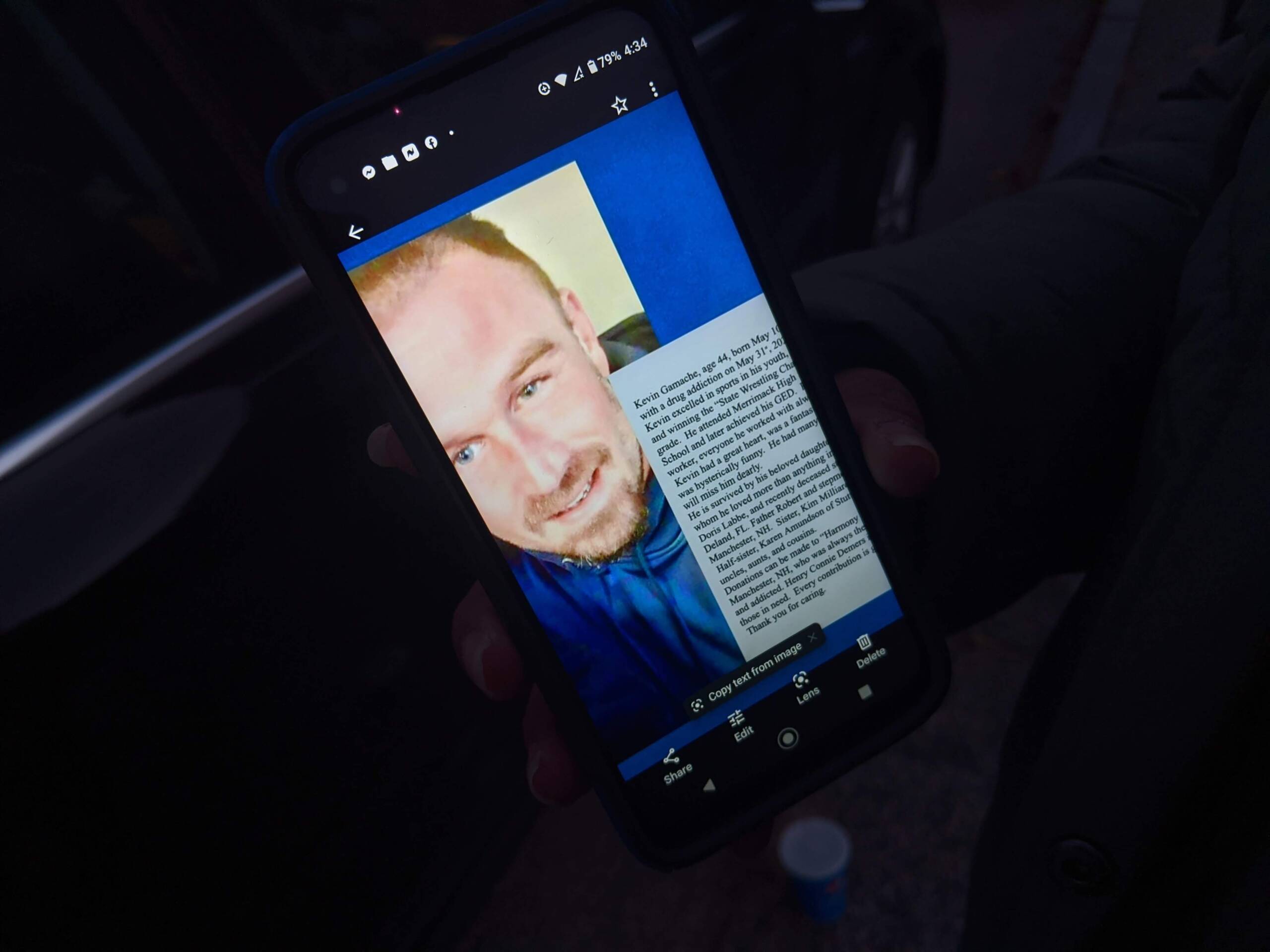
MANCHESTER, NH – “All we need is a chance.” Those are words that have haunted me ever since I heard them a year ago from a couple who were desperate to get off the streets and get their lives back.
A year ago I wrote a story about the dismantling of a high-profile homeless encampment on the state-owned courthouse lawn in downtown Manchester. The encampment in some way doubled as a symbolic presence; more than 100 people in need of home and shelter sitting on the state’s doorstep seeking help.
The state responded by sending two transport vans and moving 22 people to respite housing in Derry. The balance of people and their belongings were pushed off the property and a fence erected before day’s end to keep them off the lawn.
RELATED STORIES
- Nov. 19, 2020: Off they go: 22 homeless people offered a warm bed at Granite Recovery House, and the state’s picking up the tab
- Dec. 12, 2020: ‘All we need is a chance’: Couple moved from courthouse tent facing uncertainty again, as state funds dry up
- Dec. 22, 2020: Couple losing state-funded respite housing on Dec. 31 feeling stress of possible return to homelessness
I was able to follow for the past year the progress of two of the 22 people who were transported that day under an extended state contract with Granite House, which provided respite beds for all of them. The initial offer was for a safe space with a warm bed. If any of them wanted to go into treatment for their addictions, that could be arranged.
Lexi and Brandon left the encampment that day because they were tired of life on the streets; tired of it all. Both of them were dealing with addiction, and Brandon had layers of mental health issues.
Three weeks later, they were among only eight people of the original 22 who remained at Granite House. Others had voluntarily left according to Granite House Executive Director Eric Spofford, mainly due to rules around respite housing, which strictly enforces a no drugs or alcohol rule.
Lexi and Brandon were determined to stay sober and get their lives back on track.

But when they were told state funding for them dried up on Dec. 31, 2020, they had about a week’s notice to scramble to find someplace else to live. They thought they had until March 31, which is normally when emergency housing ends. They made calls and found a room at a Hotel 6 in Nashua for $330 a week and used their own money from disability checks – supplemented by family members – to stay as long as they could, which was about a month, eventually ending up at a Nashua rooming house for $700 a month.
Things there were going all right, Lexi recalls. It was probably the best time of her life in recent memory, the time between going to Derry and landing at the rooming house. But once there, they were living amongst others who weren’t trying to be sober and the temptation was too much.
It wasn’t long before they both fell back into old habits. They got drunk one night and had a big fight. Police were called. Both of them were arrested, and Lexi told Brandon it was time for him to leave. Lexi stayed on but was evicted after a fire broke out in June, an incident attributed to careless smoking. She regrets allowing her son to stay with her to help with the rent. She has a court hearing on Dec. 17 for reckless conduct, for a fight with her son inside the apartment. “I know I made a mistake by letting my son come live with me. I don’t know what’s going to happen in court, but I know I need an attorney.”
Last December, when asked if the state was committed to making sure those who they moved from the courthouse got the support they needed, DHHS spokesman Jake Leon told the Ink Link that they “will ensure that the individuals who are receiving treatment and shelter will continue to receive these services in 2021.”

Brandon and Lexi never had a caseworker or wrap-around services they needed. They were the last two standing, and their new life evaporated within six months of leaving Manchester. Lexi says she knows that several of those who they moved into Granite House with a year ago are now dead, most of them overdose victims.

Brandon is presently incarcerated at Valley Street Jail in connection with a September assault at Victory Park that resulted in the death of Brian Berlo. He is charged with second-degree assault. A competency hearing is set for Jan. 20. He contacts Lexi frequently from jail even though they have not been a couple since last spring.
He comes from a large and loving family. Raised on a reservation in Nova Scotia, he has battled addiction and other demons for most of his life. When he was living in Derry and Nashua, and able to get his regular medication, he was stable. He was able to hold a job, and didn’t want to go back to drinking, says Lexi.
I can’t help but wonder if things might be very different for Brandon if he’d gotten the help he needed when the state took the initiative to move him off the courthouse lawn and into respite housing. Money ran out at a time when he was looking into getting his GED and taking advantage of job training. Now, the cost of housing him at Valley Street Jail, of giving him a competency evaluation, of defending him in court should it come to that, are a given.
Lexi remains homeless. She mostly stays in Manchester bouncing between friends or her mother’s place, a senior housing complex where she can only spend the night once in a while due to restrictions. She’s fed up and feels ready for recovery. She cherishes her time with family. She’s a mother and grandmother, but isn’t welcome when she’s drinking. It is one of many heartaches she has learned to live with.
She knows she needs detox to finally get over her alcohol addiction, and then she needs time to get things in order. Her physical disability – she lost her toes on one foot to cancer several years ago – means her job options are limited by standing or walking a lot, but her heart’s desire is to have her own space again, and be financially self-sufficient.

She needs to get her original birth certificate to help tie up some of her loose ends. But there are many days that it takes all the time and energy she has to find a way to get from point A to point B, which includes networking in order to find a place to sleep.
On the day we reconnected she was in search of a warm winter coat and pair of pants, and then she was going to meet a friend who had a car she could sleep in.
“I can’t believe it’s been a year and I’m still stuck,” she told me. “I’m so tired of this life.”
She said she had put in an application to get housing a few months ago, but a few weeks later was contacted by the state and told that she isn’t eligible to apply again until January 2022, as she had Section 8 housing in the past, about five years ago. She has also been in touch with Henry Demers of Harmony Home Ministry, who was trying to connect her with a faith-based recovery center, House of Hope in Keene. The program is 18-24 months and has three steps to success according to their website:
- Create structure in their lives with Jesus Christ as the foundation
- Individualize a plan to prepare them to be self-sufficient
- Help graduates find a job and housing
Lexi told me she was interested but unsure without knowing what the program looked like. She isn’t opposed to a faith-based program, but she also doesn’t want to get herself into something that she’s not ready for. Life – with or without a higher power – has been disappointing. Her struggles go back to childhood and, trauma unchecked, can take over a person’s life, leaving them to find a way out of the darkness without a source of light.
As of this writing, she has yet to connect with the woman in charge of the program.
She is broken, but not defeated. There is something about Lexi’s spirit that gives me hope. She’s a fighter. She is intelligent and funny. She is all heart, and says she wants to get to a place in her life where she can give back in some way, and help others who are stuck like she is. Her faith in what the future might be is still there, still strong; but finding the path to a better life, and her ability to stay alive for one more New Hampshire winter, remain to be seen.







